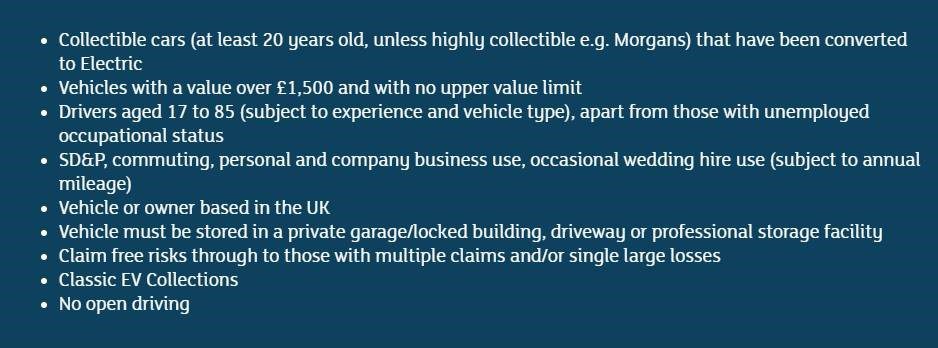‘The image of electric vehicles (EVs) as sleek and futuristic is changing.’ – BBC
It’s the question on every classic car owner’s lips: What will happen to classic cars after 2035? Since the government’s announcement to ban the sale of new petrol or diesel vehicles by 2035, our perception of petrol and diesel cars as ‘the norm’ could start to shift. It’s clear that electric cars are the future.
Although 2035 will mark the beginning of a new electric era, you’ll still be able to buy petrol and diesel cars which are already on the road. That’s good news for classic car enthusiasts – it means the sale and use of many classic cars will still be allowed.
So whether you’re a classic car owner or aspire to be, there’s no need to be too worried about the upcoming changes for now. But as more electric and hybrid cars start to roll off production lines, where does this leave the future of classics?
The simple answer is: we can’t say for certain. As providers of classic car insurance, it’s something we’re watching closely and will keep our customers updated on.
However, if current trends are anything to go by, converting classic cars to electric powered engines could become increasingly popular. This means we may end up seeing more and more electric classic cars on the road with each passing year.
WHY ARE ELECTRIC CLASSIC CARS BECOMING MORE POPULAR?
There are many reasons behind the growing popularity of converting classic cars to run on electricity, other than the upcoming petrol and diesel ban.
Steve Drummond, owner of classic conversion company Electrogenic, commented to the BBC on the turn towards electric vehicles: ‘The incentives are to buy new EVs, but that’s throwing away a whole car when you could just change the engine.’ Many, including Drummond, are calling for the government to incentivise converting older cars to electric.
Some of our customers who have converted classics to electric, have done so to give the car a new lease of life, without the need for a full engine rebuild. For example, Heritage customer Peter Brazier, who was the owner of the first Ferrari 308 to have a Tesla motor installed. He told us: ‘The engine was getting old; every summer I had to replace parts of the fuel system; the garage always smelled of oil. It was getting to that point where I had to do something with it: either sell it, or rebuild the engine, one thing or the other.’
Likewise, there are financial incentives to think about. All classic cars which are over 40 years old are eligible to become tax and MOT-exempt, even if they’ve had their petrol or diesel engine replaced with a battery.
That means owners could benefit from the perks of an electric engine but still have the tax advantages of a classic. Insurance for classic cars also tends to be far cheaper than insurance for a modern vehicle, although this does vary between different marques and models.
Another reason to convert classic cars to electric could be the adverse effect that petrol and diesel cars have on the environment – something the UK and the entire world is becoming more conscious of.
Recent examples of these environmental factors can be seen in government actions too, such as the introduction of E10 fuel in September 2021. It seems that, with more people focusing on our national and personal carbon footprint, going electric on the road is becoming a preference for many drivers of both classic and modern vehicles alike.
WILL WE SEE MORE ELECTRIC CLASSIC CAR CONVERSIONS IN THE FUTURE?
Andy McDonald, Underwriter at Heritage Car Insurance, commented that, ‘As far as the future goes, I do see an increase in classic cars being converted to electric: it’s inevitable. There are more garages around the UK who will now do the conversion including London Electric Cars & Electric Classic Cars.
‘The introduction of E10 fuel will also have an impact as it will probably push classic car owners to look at a conversion, and the cost will start to come down as the technology gets cheaper. And, with the increasing infrastructure around the country to cater for charging needs, electric conversions will be a very attractive option to a lot of owners.’
IS IT MORE DIFFICULT TO INSURE AN ELECTRIC CLASSIC CAR CONVERSION?
As with most insurance policies, it depends on the car itself. Usually, classic car insurance is fairly cheap and gives drivers ample annual mileage to boot. When it comes to transforming the inner workings of a classic car, however, insurance companies are still getting to grips with the policies that will provide the right cover.
Andy states that, ‘the insurers are starting to think more about the products they offer for electric classic cars and some are working to ensure their products are suitable for the increasing demand for electric classic car insurance.’
With Heritage, you can get your electric classic vehicle covered as long as it meets the following criteria:

In the future, we expect to see more and more insurers offering policies for electric classics. If you choose Heritage for your classic car insurance, we will work with you to find the cover that suits your next project – whether it’s an electric conversion or not.
